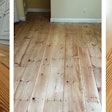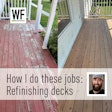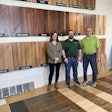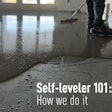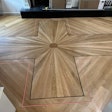
SPONSORED BY: |
The WFB Ultimate Wood Floor Guy & Gal contest was created to highlight the men and women in the flooring industry who go above and beyond in their craft and inspire other wood flooring pros with their dedication to the industry.
This year’s recipients come from two different ends of the wood flooring spectrum: one, a business owner of seven years with 20 years of experience, and one relatively new to the industry. While they have differing levels of experience, they both exhibit immense skill and passion for the trade. Our winners show us that being an “Ultimate” isn’t about time but commitment and enthusiasm for the wood flooring industry.
This year’s recipients will receive a once-in-a-lifetime free trip to Germany, where contest sponsors Lägler and Berger-Seidle will treat them to a tour of their facilities and a full slate of hands-on education during their popular Fly & Sand trip.
Do you know someone who fits the description of an Ultimate Wood Floor Guy or Gal? Are you that pro? Enter the 2025 Wood Floor Guy & Gal contest at bit.ly/uwfgg25enter.
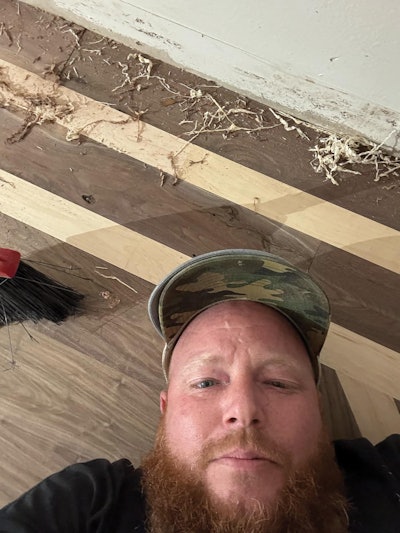
Ultimate Wood Floor Guy: Patrick Russell
COMPANY: All American Floor Sanding and Installation | Ocala, Fla.
YEARS IN THE INDUSTRY: 20
Patrick Russell lives, breathes and dreams wood floors. Russell entered the wood flooring industry two decades ago sanding floors and over the years, he has grown into a staple figure of the industry, a talented craftsman and a business owner.
“I’ve seen Patrick rise from a barely starting business to what most consider an icon of the industry,” wrote Jesse Grey, who nominated Russell for Ultimate Wood Floor Guy this year. “He has always been there to help others at the drop of a dime, including myself. Some of the jobs I’ve seen him crank out are so beautiful and unique.”
Russell owns and operates All American Floor Sanding and Installation with his business partner, Jody Breeze. Russell started the business in 2017 after working in the industry for 13 years. This is when Russell says his life became dedicated to wood floors. Opening up the business led him to developing a network of lifelong wood flooring friends that have helped Russell build his skills and knowledge of the industry.
“Patrick is a very talented craftsman who is into the art of wood flooring,” wrote Willie Short, who also nominated Russell. “He is steadily trying to educate himself and constantly pushing himself to be better.”
Having spent the first few years of his business building his network and growing his craft, Russell is tackling his next big hurdle: building up his business. And just like he has in every step in his career, Russell is leaning on his network of wood flooring friends for advice.
WFB spoke with Patrick about his career and goals for his business. The following conversation has been edited for length and clarity.
How did you get your start in the wood flooring industry?
I started sanding floors in 2004 because I kind of just needed a job. There was a guy in my neighborhood who did hardwood flooring and asked me one day if I wanted to go work with him.
I’ve worked with my friend Jody pretty much my whole career. We’ve always worked for the same people or told anybody looking to hire that we are a package deal. He was always the one that ran the edger and could coat and buff, and I could do the big machine. Then we switched off one day at a job; I let him run the big machine and I ran the edger. It wasn’t the greatest at first, but we started switching off every couple jobs to learn all the equipment.
Did you have an interest in the industry before then?
No; when I started, all the equipment was foreign to me. I’d never seen anything like it. The only thing I had run before was a buffer because I had done some stripping and waxing of VCT when I was in my teens. Other than that, I had never run a drum sander or an edger before.
What has kept you in the industry so long?
The pay was pretty good and I didn’t think the work was terribly hard when I was young. When I started, I really enjoyed making old, worn-out things look good. There’s a lot of gratification in our job. About 90% of the floors we get into are in pretty bad shape: They haven’t been maintained, and people let them go for 20, 30, 40 years before we get into the homes. We do a lot of smaller homes around here, normally built in the late 1800s or early 1900s.
 Patrick Russell with family, from left, Odin, wife Nikki, Zane, Malia and Sophia.Courtesy of Patrick Russell.
Patrick Russell with family, from left, Odin, wife Nikki, Zane, Malia and Sophia.Courtesy of Patrick Russell.
What is your favorite type of flooring project to do?
My company does a lot of heart pine. It’s pretty old—a lot of people have a tough time with it because of the sap content or because it was coated with wax or whatnot. But I enjoy those projects because they’re a little tougher. The end product is amazing to see.
Those projects are especially nice when the homeowners have been in the home for 60 years or they grew up there, and they tell you these stories and memories of the floors. It makes you connect with them. Then you turn the home over to them when you’re done and they’re blown away by how great the floors look and they’re extremely thankful. It’s a pretty good feeling.
When you started doing wood floors, what kind of training did you get?
I had no official training; it was just a straight-up crash course. The guy I started working with took one pass with me on the big machine and basically left me at the job to do the rest. When the paper blew off the machine, I didn’t even know you had to replace it. I thought the machine was tearing apart.
It wasn’t until 2018, after I started my business, that I started taking classes to improve my skills.
Can you tell me about the classes you took?
To be honest, I didn’t even know classes were available. I was basically living under a rock for a long time because I wasn’t on the internet. I started getting on the internet in 2017 to promote my business, and I started seeing all these pages of people like Daniel Boone and Lorie Davidson. My game really changed when I started following City Floor Supply because they were doing a lot of equipment demos then. I didn’t know about planetary sanders before then; we were still hard-plating or just regular buffing. I thought I was doing amazing work before I got online, but I was really doing run-of-the-mill, regular stuff. You don’t know how good it can be until you see somebody that’s doing a great job.
As for the classes, it wasn’t even the instruction that helped me the most, it was the people I met in the classes. It’s the camaraderie of all the guys and girls you meet, and everybody trades little secrets or tips, and then you get each other’s phone numbers to keep in touch. It’s so helpful to be working a job and remember this guy was doing something similar, and then you can give that person a call. The more networking you do, the more lifelines you have. There are a lot of people I met through those classes that I talk to on a weekly basis. We help each other out.
What compelled you to open your own business in 2017?
A good friend of mine named Steven was flipping a house that had some wood floors in it and Jody had the idea to sand Steven’s floors. We rented some equipment and went and sanded that floor. That immediate gratification of seeing the new floors made me think this is really what I want to do long-term. So, I created a business name and started buying equipment.
I chose to start my own business because I didn’t want to work for anybody. All the people that I worked for kind of sucked—they were not appreciative or they didn’t have the passion for it that I do.
 Russell with lifelong friend and business partner Jody Breeze.Courtesy of Patrick Russell.
Russell with lifelong friend and business partner Jody Breeze.Courtesy of Patrick Russell.
How has your business changed and grown over the years?
It’s been a long, very tiring road since 2017. I’m about to change from doing mostly sand-and-finish to trying to sell more prefinished installations and just trying to expand.
In the beginning, I wasn’t charging enough. I had to go through growing pains to get to where I was charging what I deserved. As we evolved, as we got better equipment, as we upped our skills, we upped our prices.
It was an adjustment from being just a worker to being the owner. You’re not just showing up to get a paycheck and going home after your 40 hours; now I can’t stop thinking about the work. I think about wood floors all day, every day—it’s kind of sickening [laughs].
In the beginning, it was really tough trying to find jobs and keep up on the equipment. But now that I have a good material supplier, we have good equipment and have a lot of training, it’s a completely different game.
Now I’m trying to nail down the business aspect, and that doesn’t come as naturally to me.
How are you trying to improve the business?
Since September, I traveled around the country and worked with different flooring guys and listened to a bunch of people who are doing really well in their business. I’ve been trying to figure out a game plan for how to grow my business and make more money.
We’re a small company, it’s just Jody and I and sometimes my brother. I’ve had crews that didn’t work out because I was trying to do too much and not letting people do more. It’s hard to let go when you’re used to being that guy that does everything. It’s hard to grow if you won’t let go. It’s been a struggle for me to delegate and find people and put them in place to do things and trust them.
I’ve been hanging out with Mac Davis’ company [Mac Davis Flooring in Nantucket, Mass.] because they are a well-oiled machine over there. They have a good system in place, they have the right people in place to make sure everything is flowing. For a person like me, until I see it, there’s no way I could really fully understand it. So, I went there to see what he’s got going on, and I’m going to try modeling my company after his.
 Russell and Cesar Cardona of Cardona Flooring. Russell has been traveling the country to gather business tips from pros.Courtesy of Patrick Russell.
Russell and Cesar Cardona of Cardona Flooring. Russell has been traveling the country to gather business tips from pros.Courtesy of Patrick Russell.
What did you take away from that experience?
We’re going to hire new people, get a project manager, get somebody that can go around and do the estimates and make sure supplies are coming in. I need somebody to help me do all those things so the company can keep turning money. Right now, I’m being drawn in so many different directions that I’m only getting a little bit of things done.
We also want to implement a program that can assign tasks to everybody. So, when we get more people involved, we can all see what’s going on and we all know who needs to go where and do what without making so many phone calls and second-guessing. Guys that do it by themselves—I commend them.
Guys that are handling their books, booking the jobs and doing the jobs without really working with anybody are amazing; but that’s not what I want to do anymore.
Was there a turning point recently that jump-started this desire to grow the business?
I just feel like there’s more for me than what I’ve got going on. I see other companies out there growing, and we have the skills, we have the work to do it too. I’ve been staying in the same place, I’m not leveling up. Two months ago I had this thought, “If I continue doing what I’m doing, I’m just gonna stay in the same place.”
Now I want to get to the point where I have guys working for me. Everybody has that dream to be that business owner where things are just moving along and you’re not on the tools every day. I’ve looked at other companies and if they’re doing it, I know that I can do it too. Next year is going to be a good year for me.
Craftsmanship is a big part of your work as well. Do you still plan on doing installs in this new business frontier?
Yes; that’ll never go away. That’s like a disease. Everybody likes to test their abilities and make something cool. If I didn’t need to make money to support my family, I would do floors for free. There’s a lot of floors we get into where I go, “You know what would be cool? If we did this.” As far as I’m concerned, I’m still in the beginning phase of doing cool stuff. I’m definitely not going to stop as the business grows.
 Russell and son Zane at DM Hardwood Designs class in Ocala, Fla.Courtesy of Patrick Russell.
Russell and son Zane at DM Hardwood Designs class in Ocala, Fla.Courtesy of Patrick Russell.
You were nominated for the award by five people, how does that feel?
I’m extremely thankful and it’s kind of unbelievable in a way. I’ve got a lot of great mentors; I’m very blessed.
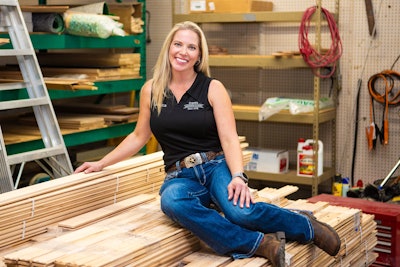
Ultimate Wood Floor Gal: Jessica Hall
COMPANY: Dramis Hardwood Floors | Fayetteville, Ark.
YEARS IN THE INDUSTRY: 2
Jessica Hall had built a stable career in corporate America, but an unexpected life transformation during the pandemic led her to the wood flooring industry—and now she’s here to stay.
Hall had been working in marketing and technology for 14 years when the pandemic hit. Working from home had her feeling isolated and anxious, which compelled her to quit her job and begin working a more costumer-focused job assisting with marketing for a contractor. Hall says she was instantly fascinated with the trade industry and began volunteering to assist with jobs. So, when a friend in the wood flooring business asked Hall if she would like to try her hand at sanding and refinishing, she was hesitant but decided to give it a chance and started on the drum sander her first day on the job.
“Jessica’s journey is a true testament to perseverance, passion and the power of breaking barriers,” wrote Thomas Stephenson, Hall’s coworker, who nominated her for Ultimate Wood Floor Gal this year.
Hall says she doesn’t fit the typical wood floor pro mold—she entered the industry at 40 and describes herself as a petite woman who had no flooring knowledge before her first day of work. But now she’s carving out her place in the industry and hopes to inspire others to pursue a career path they’re passionate about.
“She is breaking down the outdated stigma that hardwood flooring is a man’s job and proving that women can excel in any trade at any stage of life,” Stephenson says. “Jessica’s story is a powerful reminder that it’s never too late to pursue what you love, regardless of age or gender.”
WFB spoke with this year’s Ultimate Wood Floor Gal, Jessica Hall, about her career and thoughts on the industry. The following conversation has been edited for length and clarity.
 Hall left corporate America at age 40 to begin a career sanding and finishing floors.Courtesy of Jessica Hall.
Hall left corporate America at age 40 to begin a career sanding and finishing floors.Courtesy of Jessica Hall.
What was your background before you got into hardwood flooring?
I spent most of my life working in corporate. I spent 12 years in marketing and another two years in technology. During COVID, we were sent home to work and I just got very depressed and very anxious to the point where I told my employer to lay me off. They did, and I had no clue what I was going to do next.
How did you get started in the hardwood flooring industry?
After leaving corporate life, I planned to take the summer off. Then, I met a general contractor whose website and pictures were terrible. I jokingly told him I could improve his marketing, and he said, “Let’s do it.” So, I updated his website, took some pictures and posted on social media. In just two months, his sales went from $30,000 to $300,000.
I originally thought it could be a part-time gig because, at this time, I wasn’t sure what I wanted to do next. But I gave myself the summer to figure out whether I’d stay in corporate and apply for another position or try something new.
For the first six months, I helped with marketing and sales, but had no idea what I was doing; I was just figuring it out as I went. We worked on everything from landscaping and deck building to fence building and roofing. Over time, I noticed things were not being done properly and customers were being taken advantage of. The more I saw the mistakes, the more I wanted to learn the trade myself. I even volunteered to help on-site to ensure things were done correctly. After a disagreement with the contractor, I told him, “I can’t defend your name and my name all the time.” So, I ended up quitting.
Around that time, my friend Luke bought Dramis Hardwood Floors, and he convinced me to meet my current work partner Damien. When I met Damien, he told me if I promised to show up, he would train me on everything I needed to know about wood floors. He put me on the drum day one, and I fell in love.
Sanding floors for a living was never something I had considered. When I finally agreed to give it a chance, everything just fell into place.
Did you have any experience in the trades before jumping into the industry?
Zero. I’ve always had an interest in carpentry but never had the confidence or knowledge to do it. When I started helping fix things on-site, I started thinking to myself, “I can do that.” So, when I moved onto floors, it felt natural, and I took to it easily.
What is it about wood floors that you love?
I love seeing that instant change from old to new, whether it’s a sand-and-finish or a new install. It’s so satisfying when a customer comes in and is excited about how beautiful their floors look.
Customer service has always been a passion of mine, so being able to satisfy customers and know that I’m working for them means a lot to me. In corporate America, I quickly learned that the focus wasn’t on the customer; it was often about meeting executive preferences. I’d see large amounts of money spent on photography or print changes to suit personal tastes, which felt like a missed opportunity to invest in the customer experience. When I moved into flooring, I loved that my work could be truly customer-centered. I still maintain great relationships with many of my past clients.
 Hall started on the drum sander her first day as a wood floor sander.Courtesy of Jessica Hall.
Hall started on the drum sander her first day as a wood floor sander.Courtesy of Jessica Hall.
Do you have any memorable customer experiences?
My first customer was this 84-year-old fiery redhead named Mary, who I still get together with for a glass of wine occasionally. Unfortunately, the first contractor I worked with wasn’t providing her with the quality work she deserved. I assured her she could trust me to take care of it—and I did. She’s been my No. 1 cheerleader through every step of my trade learning journey.
Did you get any training when you started sanding and finishing floors?
Every bit of my training was hands-on. It was like, “This is what we’re doing today, so here’s how you do it.”
Damien, who has over 20 years of experience in the trades, has been an incredible teacher. On my first day, he put me on the drum sander, and I left stop marks all over the floor. But he taught me how to remove those marks and how to avoid creating them in the first place.
Tell me about Damien. What is he like to work with and what did you learn from him?
Damien and I have been working together for about two years and we’ve always clicked. Our teamwork is seamless. We instinctively know what the other will do, which helps us stay ahead and keep the job moving efficiently. One thing I really appreciate is that he lets me have a voice. In an industry where mansplaining is common, Damien allows me to try things first before stepping in with tips. From day one, he’s been a great teacher—very patient and supportive.
 Hall encourages other women to push past any fears of joining the trades and jump in if they are interested.Courtesy of Jessica Hall.
Hall encourages other women to push past any fears of joining the trades and jump in if they are interested.Courtesy of Jessica Hall.
Do you remember the first flooring project you did?
It was a sand and finish job on an old floor—likely from the 60s. The customer wanted it sanded down and matched to LVP in the home, which isn’t easy to do. I met Damien on the site, and while he’s pretty quiet, I’m more of a talker. About 90 questions in, he handed me the drum sander and said, “Alright, here’s what you do.”
He showed me how to run it back and forth, but I didn’t quite catch the concept of lifting and lowering the drum. I even thought you were supposed to dig it into the floor, which is definitely not the way to do it.
Instead of taking over the machine, Damien stopped what he was doing to teach me how to remove the stop marks and then showed me the right way to move the machine and walk with it. Ever since the drum sander has been my favorite tool for sanding. It was tough in the beginning—I remember going home sore and thinking, “This is going to be hard. I’m not sure I can do this.” But with each project, I learned a little more and it has gotten easier.
Now that you’ve been in the industry a while, do you have any advice for people looking to get into wood flooring?
I spent 14 years in marketing and tech, working a job that paid the bills but didn’t bring me real joy. Like many people, I stayed with it because I thought it was what I was “supposed to do.” At 40, I made a complete career change, and I can’t imagine going back. It’s never too late to start over.
I know there are women out there interested in this industry but hesitant to try. My advice is: just go for it. Yes, it’s intimidating, but there are so many people willing to help you learn. Some days, this job makes me feel like a total badass.
Women bring a unique eye for detail, and for me, combining that with my corporate background has allowed me to find more efficient ways to do the work. My journey taught me it’s not about following the expected path—it’s about finding what truly fulfills you. So, don’t let age or expectations hold you back. If you’re unfulfilled, take the leap toward something that brings you joy.
 Perseverance is the most important quality for a wood flooring pro, Hall says.Courtesy of Jessica Hall.
Perseverance is the most important quality for a wood flooring pro, Hall says.Courtesy of Jessica Hall.
How does it feel to be a woman working in a male-dominated field?
It has its challenges. People often take out their phones to snap pictures while I’m working, which can be frustrating and embarrassing.
Once we were sanding down a deck and as soon as I started running the drum, about 15 contractors circled around and started filming me. That’s when having a great partner matters because Damien came up behind me with his phone and pointed it at them and they all stopped immediately.
It’s tough when men in the industry doubt you, but there’s nothing more satisfying than proving them wrong.
What qualities do you think people need to succeed as a wood floor pro?
Perseverance. You have to be willing to push through, even on days when you think, “What was I thinking?” I went from sitting at a computer to having calloused hands, and it’s not easy work. You have to be ready to work hard and accept that the work is going to be hard. It’s challenging by nature.
When something goes wrong on a job, or I am struggling with an install, I’ll call Luke to vent, and he always says, “They don’t call us for easy. If it were easy, everyone would do it.” I remind myself of that often.
 Courtesy of Jessica Hall.
Courtesy of Jessica Hall.























